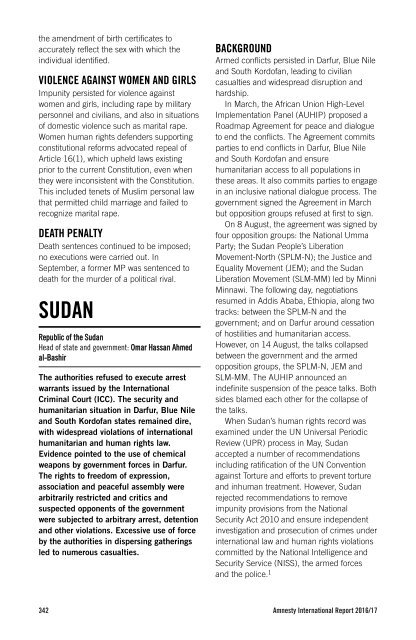AMNESTY INTERNATIONAL REPORT 2016/17
2lEHU9j
2lEHU9j
Create successful ePaper yourself
Turn your PDF publications into a flip-book with our unique Google optimized e-Paper software.
the amendment of birth certificates to<br />
accurately reflect the sex with which the<br />
individual identified.<br />
VIOLENCE AGAINST WOMEN AND GIRLS<br />
Impunity persisted for violence against<br />
women and girls, including rape by military<br />
personnel and civilians, and also in situations<br />
of domestic violence such as marital rape.<br />
Women human rights defenders supporting<br />
constitutional reforms advocated repeal of<br />
Article 16(1), which upheld laws existing<br />
prior to the current Constitution, even when<br />
they were inconsistent with the Constitution.<br />
This included tenets of Muslim personal law<br />
that permitted child marriage and failed to<br />
recognize marital rape.<br />
DEATH PENALTY<br />
Death sentences continued to be imposed;<br />
no executions were carried out. In<br />
September, a former MP was sentenced to<br />
death for the murder of a political rival.<br />
SUDAN<br />
Republic of the Sudan<br />
Head of state and government: Omar Hassan Ahmed<br />
al-Bashir<br />
The authorities refused to execute arrest<br />
warrants issued by the International<br />
Criminal Court (ICC). The security and<br />
humanitarian situation in Darfur, Blue Nile<br />
and South Kordofan states remained dire,<br />
with widespread violations of international<br />
humanitarian and human rights law.<br />
Evidence pointed to the use of chemical<br />
weapons by government forces in Darfur.<br />
The rights to freedom of expression,<br />
association and peaceful assembly were<br />
arbitrarily restricted and critics and<br />
suspected opponents of the government<br />
were subjected to arbitrary arrest, detention<br />
and other violations. Excessive use of force<br />
by the authorities in dispersing gatherings<br />
led to numerous casualties.<br />
BACKGROUND<br />
Armed conflicts persisted in Darfur, Blue Nile<br />
and South Kordofan, leading to civilian<br />
casualties and widespread disruption and<br />
hardship.<br />
In March, the African Union High-Level<br />
Implementation Panel (AUHIP) proposed a<br />
Roadmap Agreement for peace and dialogue<br />
to end the conflicts. The Agreement commits<br />
parties to end conflicts in Darfur, Blue Nile<br />
and South Kordofan and ensure<br />
humanitarian access to all populations in<br />
these areas. It also commits parties to engage<br />
in an inclusive national dialogue process. The<br />
government signed the Agreement in March<br />
but opposition groups refused at first to sign.<br />
On 8 August, the agreement was signed by<br />
four opposition groups: the National Umma<br />
Party; the Sudan People’s Liberation<br />
Movement-North (SPLM-N); the Justice and<br />
Equality Movement (JEM); and the Sudan<br />
Liberation Movement (SLM-MM) led by Minni<br />
Minnawi. The following day, negotiations<br />
resumed in Addis Ababa, Ethiopia, along two<br />
tracks: between the SPLM-N and the<br />
government; and on Darfur around cessation<br />
of hostilities and humanitarian access.<br />
However, on 14 August, the talks collapsed<br />
between the government and the armed<br />
opposition groups, the SPLM-N, JEM and<br />
SLM-MM. The AUHIP announced an<br />
indefinite suspension of the peace talks. Both<br />
sides blamed each other for the collapse of<br />
the talks.<br />
When Sudan’s human rights record was<br />
examined under the UN Universal Periodic<br />
Review (UPR) process in May, Sudan<br />
accepted a number of recommendations<br />
including ratification of the UN Convention<br />
against Torture and efforts to prevent torture<br />
and inhuman treatment. However, Sudan<br />
rejected recommendations to remove<br />
impunity provisions from the National<br />
Security Act 2010 and ensure independent<br />
investigation and prosecution of crimes under<br />
international law and human rights violations<br />
committed by the National Intelligence and<br />
Security Service (NISS), the armed forces<br />
and the police. 1<br />
342 Amnesty International Report <strong>2016</strong>/<strong>17</strong>


